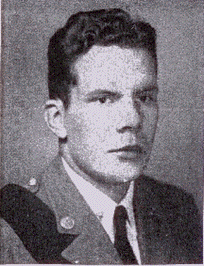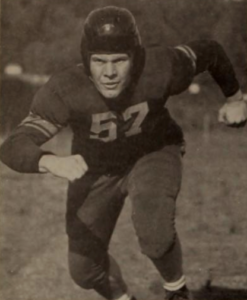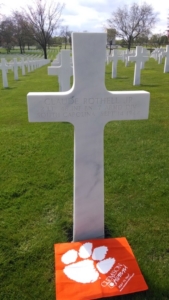Scroll of Honor – Stephen Randolph Hilton
The Deadlier Opponent
Written by: Kelly Durham
Claude Rothell, Jr. came to Clemson College from Saluda County as a member of the Class of 1943. His class was the last  cohort to complete its academic career until after the war. Following commencement, Claude and his classmates headed directly to active duty, many of them funneling into officers’ candidate schools. Most of the other boys on campus were sent to basic training, their school days suspended for the duration.
cohort to complete its academic career until after the war. Following commencement, Claude and his classmates headed directly to active duty, many of them funneling into officers’ candidate schools. Most of the other boys on campus were sent to basic training, their school days suspended for the duration.
Claude made the most of his four years as a cadet, engaging in academic, social, and athletic pursuits. An animal husbandry major, Claude served as executive officer of Company G, 1st Battalion, 1st Regiment of Clemson’s Cadet Brigade. He was a member of Alpha Chi Psi, a social organization, and the Saluda-Lexington Club. He served as the vice president of the Animal Husbandry Club and was a member of the Block “C” Club.
Claude was a four-year member of the Tiger football team, spanning the transition from head coach Jess Neely to head coach Frank Howard. Claude’s senior campaign achieved mixed results as the Tigers finished with a 3-6-1 record. Claude, at 176 pounds, played in the backfield on both offense and defense. The Tigers’ first contest of the 1942 season inaugurated the campus’s new Memorial Stadium with a 6-4 win over Presbyterian College. The Tigers triumphed against South Carolina, 18-6, in the annual Big Thursday game, which was the Tigers’ 200th all-time victory. The Tigers closed their home season with a 12-7 win over  Furman. In a sign of the times, Clemson also took the field against a team from Jacksonville Naval Air Station, losing 24-6. At the end of the season, Rothell and his teammates must have turned their thoughts toward the deadlier opponents that awaited overseas.
Furman. In a sign of the times, Clemson also took the field against a team from Jacksonville Naval Air Station, losing 24-6. At the end of the season, Rothell and his teammates must have turned their thoughts toward the deadlier opponents that awaited overseas.
After graduation, Rothell was ordered to Fort Benning, Georgia to attend officer candidate school. He completed his training in December and was soon assigned to the 48th Infantry Battalion of the 7th Armored Division. In April 1944, Rothell shipped overseas.
On August 13-14, the 7th Armored Division landed in Normandy and was assigned to General George Patton’s Third Army. The division battled its way into France, attacking German forces defending the city of Chartres and then proceeding to liberate Dreux. On August 24, the division liberated Melun, south of Paris, where it crossed the Seine River. With the German resistance weakening, the division raced ahead liberating the storied Great War battlefields of Château-Thierry and then Verdun on August 31.
The 7th Armored halted for rest, maintenance, and refueling at the beginning of September, but was soon back on the offensive. In France, one river led to another and on September 6, the division crossed the Moselle near Metz. Enemy fortifications and unfavorable terrain made the crossing untenable. In mid-September, the 7th Armored joined with the 5th Infantry Division to expand a new bridgehead over the Moselle farther to the south near Arnaville.
Second Lieutenant Rothell was killed in action in France on September 14, 1944. Ironically, he fell on the same day as his  Clemson classmate Henry Hahn, who was assigned to one of the 7th Armored Division’s tank battalions.
Clemson classmate Henry Hahn, who was assigned to one of the 7th Armored Division’s tank battalions.
Claude Rothell, Jr. was survived by his parents, his wife Margaret, and two brothers, one of whom was in the Navy’s V-12 officer training program. He was awarded the Purple Heart and buried at the Lorraine American Military Cemetery.
For more information about Claude Rothell, Jr. see:
https://soh.alumni.clemson.edu/scroll/claude-rothell-jr/
For additional information about Clemson University’s Scroll of Honor visit:
https://soh.alumni.clemson.edu/
